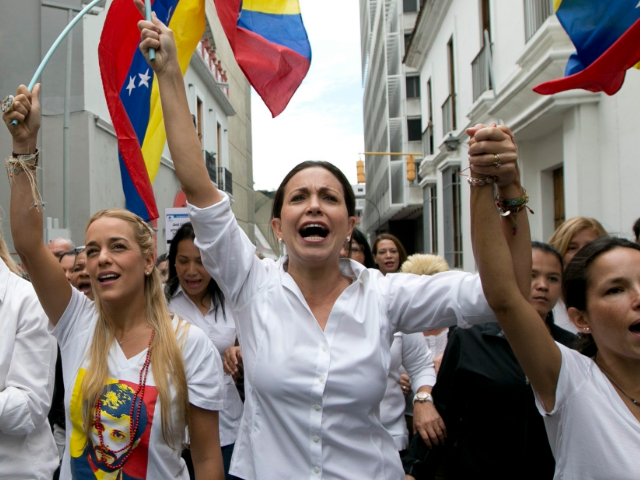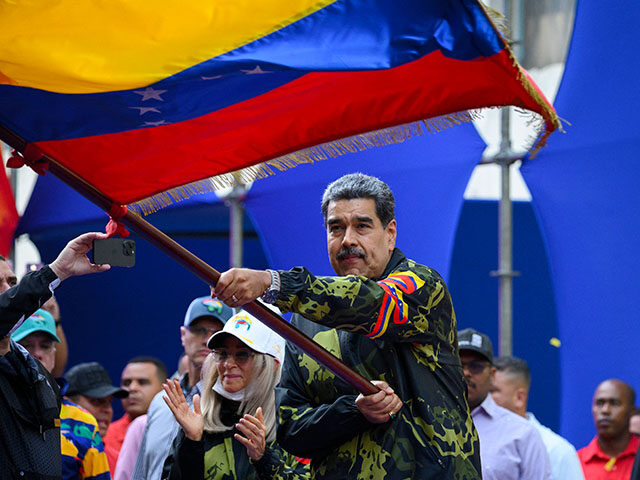Assistant Secretary of State for Western Hemisphere Affairs Brian Nichols said on Thursday that the incentives the administration of President Joe Biden granted to Venezuela’s socialist regime were not “sufficient” to convince dictator Nicolás Maduro to carry out a “free and fair” presidential election.
Nichols made the assertion during a conference held by the Americas Society on the subject of the Biden administration’s Western Hemisphere policies.
Nichols said:
I think we have to make it very clear that the incentives that we and I think others in the international community have put on the table to move towards a competitive election in Venezuela have not been sufficient to motivate reforms and openness that Maduro’s side believes would jeopardize his government.
The Biden administration, which, for years, has encouraged Maduro to hold a “free and fair” election, offered the dictator lavish concessions in exchange for vague promises that the regime never indicated it would honor. By far the most lucrative incentive given was a broad oil and gas sanction relief package in October that allows Venezuela to once again freely sell its oil in U.S. and international markets.

Nicolás Maduro (Carlos Becerra/Bloomberg via Getty Images)
The sanctions relief package restored the authoritarian regime’s main source of revenue after the administration of former President Donald Trump imposed sanctions on state oil company PDVSA in 2019 in response to the Maduro regime’s continued gross human rights violations against its own people.
The Maduro regime announced Tuesday that Venezuela would hold a sham presidential election on July 28. Venezuelan authorities chose that date because it marks the birthday of late dictator Hugo Chávez — a pseudo-holiday celebrated by the ruling socialists.
Maduro’s opponent and frontrunner in a hypothetical real election, María Corina Machado of Venezuela’s only mainstream center-right party Vente Venezuela, is banned from running for public office. Polls released at the end of 2023 show that Machado, in an actual free and fair election, would obtain more than 70 percent of the votes against Maduro for president.

Maria Corina Machado (AP Photo/Ariana Cubillos)
In Thursday’s conference, Nichols, on behalf of the United States, urged other Latin American countries to pressure the Maduro regime so that the sham July 28 presidential election is “free and democratic.”
“I think the leaders of those [Latin American] nations should continue to convey the message that the Venezuelan people deserve the same opportunity to make a choice and that a true leader stands for election and respects the people’s choice,” Nichols said.
The Maduro regime’s sham election announcement marks the final nail in the coffin of the “Barbados agreement,” a document signed in October between representatives of the socialist regime and representatives of Venezuela’s Unitary Platform “opposition” coalition.
The agreement, signed under the observation of the administration of U.S. President Joe Biden and Secretary of State Antony Blinken, contemplated a series of steps towards holding a “free and fair” presidential election sometime during the second half of 2024.
In return, Biden signed off the ample oil and gas sanctions relief package, which, according to the White House, may not be renewed in April, as the Maduro regime has repeatedly violated the terms of the agreement. Maduro recently announced that the Barbados agreement was void and “replaced” it with a deal signed in Caracas alongside a group of collaborationist organizations, absent the Unitary Platform.
Nichols stated that the United States supports Venezuela’s “democratic process” despite the evidence of abuses by Maduro. Nichols nonetheless recognized Maduro was taking steps “in the wrong” direction, such as upholding Machado’s electoral ban.
The assistant secretary of state said that the United States took “a calculated risk” about the likelihood that the “heirs of Hugo Chávez’s legacy would allow an election in which they did not control the outcome.”
“We ultimately concluded that the status quo was bad for America, good for our adversaries, and would not advance the cause of democracy,” he claimed.
Nichols also expressed that Washington is “worried” about the tight deadlines imposed by the Maduro regime ahead of the July 28 sham election. The electoral calendar presented by Venezuela’s socialist-controlled National Electoral Council (CNE) only allows prospective and not-banned candidates to present their candidacies between March 21-25 and gives Venezuelans less than a month to update their voter registry information if required.
“Timelines are tight and we don’t want to prejudge how things will turn out, but the direction of travel is deeply concerning,” Nichols commented.
Maduro was first elected as president of Venezuela in April 2013 in a snap election following the death of Hugo Chávez. The 2013 election, which Maduro “won” by a 1.49-percent vote difference, was plagued with thousands of documented irregularities. The socialist dictator then held a sham election in 2018 where only handpicked “rivals” were allowed to run against him. The highly fraudulent and internationally condemned election allowed Maduro to secure a new six-year term set to end in January 2025.
With Machado banned and no other opposition politicians remaining aside from little-known and/or highly unpopular “opposition” candidates, Maduro has paved the way for a new six-year term “reelection.”
Venezuela’s ruling United Socialist Party of Venezuela (PSUV) removed all public office term limits in a 2009 constitutional amendment sham referendum.
Biden, during Thursday’s State of the Union address, made no mention of Venezuela, the Maduro regime, or how his administration’s policies and concessions have helped bolster the rogue socialist regime, such as releasing Maduro’s alleged top money launderer Alex Saab in December.
A report published in 2023 indicated that the Biden administration’s migration policies — which have allowed more than 500,000 Venezuelan migrants to enter the United States — have been a “safety valve” for the Maduro regime, as it has helped ease internal pressure on Venezuela, reducing the likelihood of riots and rebellions.
WATCH: Venezuelans Celebrate Their March from Venezuela to El Paso, Texas
Video Source: 1strespondersmedia / TwitchThe report also states that remittances sent by Venezuelans to their families have also helped the Venezuelan economy, as decades of socialist mismanagement have pushed it to the brink of complete collapse.
Christian K. Caruzo is a Venezuelan writer and documents life under socialism. You can follow him on Twitter here.

COMMENTS
Please let us know if you're having issues with commenting.